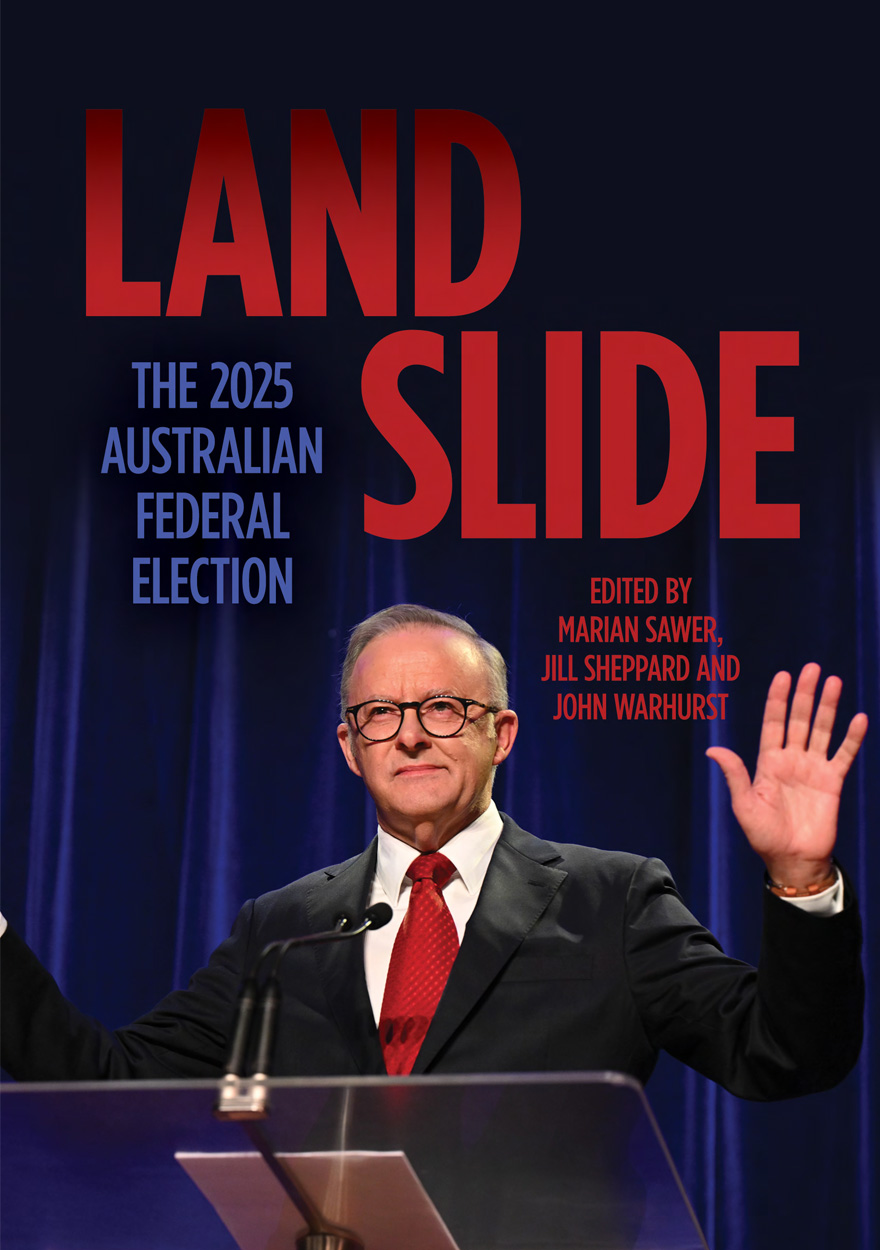Marian Sawer
Marian Sawer AO is an emeritus professor in the School of Politics and International Relations, The Australian National University.

Landslide »
The 2025 Australian Federal Election
Publication date: 2026
The 2025 Australian federal election saw an unexpected landslide victory for the Labor Party, the Liberal Party’s worst ever result and the continued rise of the non-major-party vote. In this book, Australia’s leading election analysts explore what contributed to this outcome, including the effectiveness of party and third-party campaigns, the changing demography of the electorate and external factors such as the ‘Trump effect’.
Baby boomers were outnumbered in 2025 by Gen Z and Millennials, who related to politics in a different way. Those pursuing their votes needed to do so through social media; influencers and podcasts became central to campaigning, as did humour appropriating popular culture with the help of AI. Increased cultural and linguistic diversity was also important, and there were new efforts to mobilise Muslim voters over the war in Gaza. Overshadowing it all was Trump. While populist themes seemed attractive at first, association with Trump quickly became a liability, and contributors here examine the difficulty of changing discourses mid-campaign.
This authoritative study is indispensable in understanding the new political landscape: polls and voting behaviour, misinformation, gender issues and competing leadership styles. Richly illustrated, the role of visual politics also receives close scrutiny.
Landslide is the nineteenth book in the ANU Press Australian Federal Election series. The series is sponsored by the Academy of the Social Sciences in Australia.
Coming soon
Notify me
Watershed »
The 2022 Australian Federal Election
Publication date: August 2023
Australia’s 2022 federal election played out in ways that few could have expected. Not only did it bring a change of government; it also saw the lowest number of primary votes for the major parties and the election of the greatest number of Independents to the lower house since the formation of the Australian party system. The success of the Teal Independents and the Greens, along with the appetite voters showed for ‘doing politics differently’, suggested that the dominant model of electoral competition might no longer be the two-party system of Labor versus Liberal. At the very least, the continued usefulness of the two-party-preferred vote as a way of conceptualising and predicting Australians’ voting behaviour has been cast into serious doubt.
In Watershed, leading scholars analyse the election from the ground up—focusing on the campaign issues, the actors involved, and the successes and failures of campaign strategy—and show how digital media, visual politics and fake news are changing the way politics is done. Other topics include the impact of COVID-19 and the salience of climate, gender and integrity issues, as well as voting patterns and polling accuracy. This authoritative book is indispensable for understanding the disenchantment with the major parties, the rise of Community Independents, and the role of the Australian Greens and third parties.
Watershed is the eighteenth in the ANU Press federal election series and the tenth sponsored by the Academy of the Social Sciences in Australia.
‘The Australian election books have been appearing after each election since the 1987 election, and with ANU Press as publisher since 2010. As chair of the Social Sciences Editorial Committee, I am proud of this connection: it is a prestige publication … The rise of fact-free partisanship makes the kind of considered discussion being carried on here more significant than ever.’
– Frank Bongiorno, Launch speech for Watershed: The 2022 Australian Federal Election, 18 October 2023.

Morrison's Miracle »
The 2019 Australian Federal Election
Publication date: July 2020
This book, the 17th in the federal election series and the ninth sponsored by the Academy of the Social Sciences in Australia, provides a comprehensive account of the 2019 Australian election, which resulted in the surprise victory of the Coalition under Scott Morrison. It brings together 36 contributors who analyse voter behaviour, campaign strategies, regional variations, polling, ideology, media and the new importance of memes and digital campaigning. Morrison’s victory underlined the continuing trend toward the personalisation of politics and the loss of trust in political institutions, both in Australia and across western democracies. Morrison’s Miracle is indispensable for understanding the May 2019 Coalition victory, which surprised many observers and confounded pollsters and political pundits.

Party Rules? »
Dilemmas of political party regulation in Australia
Edited by: Anika Gauja, Marian Sawer
Publication date: October 2016
Trust in political parties has never been lower, but we have more and more of them, to the point where voters need magnifying sheets to read ballot papers. What is the relationship between party regulation and the nature of our democracy? How is it that parties have been able to gather so many public resources yet with so little scrutiny of their affairs? This is the first book on party regulation in Australia. It covers a wide range of issues, from party donations to candidate selection, from expectations of parties in a representative democracy to the reluctance to regulate and the role of the courts where legislators fear to tread.
‘The regulation of political parties is one of the most important, but unexplored areas of Australian electoral policy. This important book fills that gap in providing a stimulating and insightful analysis of the pitfalls and potential solutions in this area.’
— Professor George Williams AO



